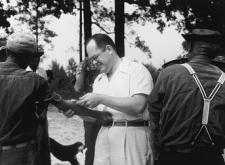Did Infamous Tuskegee Study Cause Lasting Mistrust of Doctors Among Blacks?
By Aaron E. Carroll,
The New York Times
| 06. 17. 2016
There is no question that the Tuskegee study is one of the most horrific examples of unethical research in recent history. For 40 years, ending in 1972, members of the United States Public Health Service followed African-American men infected with syphilis and didn’t treat them (although they told some men they did) so that they could see the disease take its course.
There’s also no question that this experiment shook the foundations of trust between Americans, especially black Americans, and the medical establishment. A new paper argues that this wound was so severe that it led older African-American men to avoid care, leading to a decrease in life expectancy of 1.4 years, accounting for about a third of the discrepancy in life expectancy between black and white men by 1980.
While few question that there are racial disparities in life expectancy or health care, and no one questions the utter lapse in ethics of the Tuskegee experiment, we should still be wary in connecting the two without a clear causal link. To do so compounds mistrust in the health care...
Related Articles
By Dareh Gregorian, NBC News | 10.17.2024
By Mackenzie Mays, Los Angeles Times | 10.29.2024
SACRAMENTO — Gov. Gavin Newsom signed a bill on Sunday that requires large health insurance companies to cover in vitro fertilization — a win for reproductive health advocates amid nationwide concerns about the future of access to fertility treatments.
The bill also...
Reproductive rights have been a flashpoint in national politics for decades, with the stakes surging after the Supreme Court shredded the right to an abortion. In the current presidential campaign, the battle over abortion has swelled and morphed to encompass in vitro fertilization (IVF), which has now moved rapidly from widely accepted to partisan hot button.
This dramatic shift was highlighted by the February decision of the Alabama Supreme Court that granted personhood rights to frozen IVF embryos, signaling that...
By Sara Moretto, The Varsity | 09.22.2024
It was 2020. I was wrapping up grade nine science with a solid 60 per cent, hoping that if anyone saw my failed tests in the recycling bin, it would contribute to an air of mystery about me. This reason...




